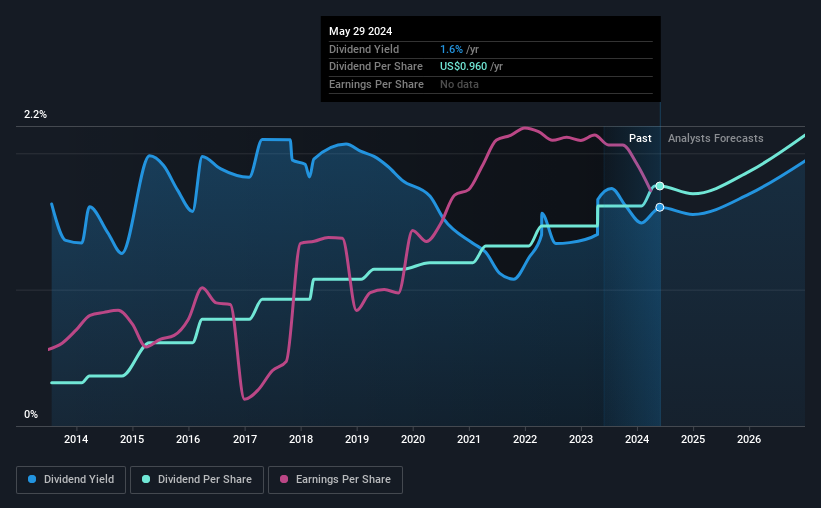- United States
- /
- Capital Markets
- /
- NasdaqGS:NDAQ
Nasdaq's (NASDAQ:NDAQ) Shareholders Will Receive A Bigger Dividend Than Last Year
The board of Nasdaq, Inc. (NASDAQ:NDAQ) has announced that it will be paying its dividend of $0.24 on the 28th of June, an increased payment from last year's comparable dividend. Even though the dividend went up, the yield is still quite low at only 1.6%.
See our latest analysis for Nasdaq
Nasdaq's Earnings Easily Cover The Distributions
If it is predictable over a long period, even low dividend yields can be attractive. Based on the last payment, Nasdaq was quite comfortably earning enough to cover the dividend. This means that a large portion of its earnings are being retained to grow the business.
The next year is set to see EPS grow by 52.5%. If the dividend continues on this path, the payout ratio could be 39% by next year, which we think can be pretty sustainable going forward.

Nasdaq Has A Solid Track Record
The company has a sustained record of paying dividends with very little fluctuation. Since 2014, the annual payment back then was $0.173, compared to the most recent full-year payment of $0.96. This works out to be a compound annual growth rate (CAGR) of approximately 19% a year over that time. So, dividends have been growing pretty quickly, and even more impressively, they haven't experienced any notable falls during this period.
The Dividend Looks Likely To Grow
The company's investors will be pleased to have been receiving dividend income for some time. We are encouraged to see that Nasdaq has grown earnings per share at 10% per year over the past five years. Since earnings per share is growing at an acceptable rate, and the payout policy is balanced, we think the company is positioning itself well to grow earnings and dividends in the future.
An additional note is that the company has been raising capital by issuing stock equal to 17% of shares outstanding in the last 12 months. Trying to grow the dividend when issuing new shares reminds us of the ancient Greek tale of Sisyphus - perpetually pushing a boulder uphill. Companies that consistently issue new shares are often suboptimal from a dividend perspective.
Nasdaq Looks Like A Great Dividend Stock
Overall, a dividend increase is always good, and we think that Nasdaq is a strong income stock thanks to its track record and growing earnings. Earnings are easily covering distributions, and the company is generating plenty of cash. All of these factors considered, we think this has solid potential as a dividend stock.
Market movements attest to how highly valued a consistent dividend policy is compared to one which is more unpredictable. At the same time, there are other factors our readers should be conscious of before pouring capital into a stock. Just as an example, we've come across 2 warning signs for Nasdaq you should be aware of, and 1 of them doesn't sit too well with us. Is Nasdaq not quite the opportunity you were looking for? Why not check out our selection of top dividend stocks.
Valuation is complex, but we're here to simplify it.
Discover if Nasdaq might be undervalued or overvalued with our detailed analysis, featuring fair value estimates, potential risks, dividends, insider trades, and its financial condition.
Access Free AnalysisHave feedback on this article? Concerned about the content? Get in touch with us directly. Alternatively, email editorial-team (at) simplywallst.com.
This article by Simply Wall St is general in nature. We provide commentary based on historical data and analyst forecasts only using an unbiased methodology and our articles are not intended to be financial advice. It does not constitute a recommendation to buy or sell any stock, and does not take account of your objectives, or your financial situation. We aim to bring you long-term focused analysis driven by fundamental data. Note that our analysis may not factor in the latest price-sensitive company announcements or qualitative material. Simply Wall St has no position in any stocks mentioned.
About NasdaqGS:NDAQ
Nasdaq
Operates as a technology company that serves capital markets and other industries worldwide.
Solid track record average dividend payer.
Similar Companies
Market Insights
Weekly Picks


Crazy Undervalued 42 Baggers Silver Play (Active & Running Mine)


Fiducian: Compliance Clouds or Value Opportunity?

Willamette Valley Vineyards (WVVI): Not-So-Great Value
Recently Updated Narratives

Halyk Bank of Kazakhstan will see revenue grow 11% as their future PE reaches 3.2x soon

Silver's Breakout to over $50US will make Magma’s future shine with drill sampling returning 115g/t Silver and 2.3 g/t Gold at its Peru Mine

SEGRO's Revenue to Rise 14.7% Amidst Optimistic Growth Plans
Popular Narratives


MicroVision will explode future revenue by 380.37% with a vision towards success


NVDA: Expanding AI Demand Will Drive Major Data Center Investments Through 2026




